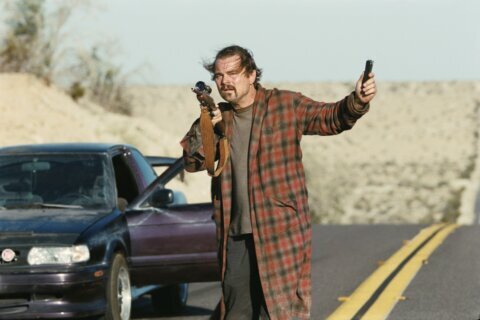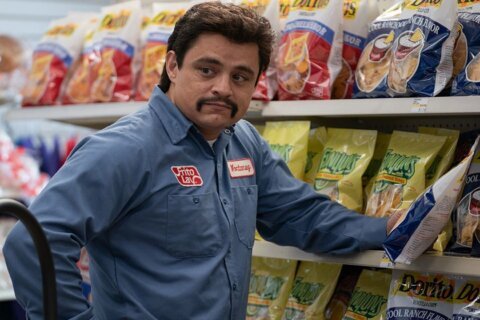Countdown to the Oscars: Join WTOP for an in-depth look at all nine Best Picture nominees every Wednesday and Friday until the Academy Awards on February 26.
Jason Fraley, WTOP Film Critic
WASHINGTON – Bogie once said, “We’ll always have Paris.” I hope we’ll always have Woody Allen.
It’s so rare to find a filmmaker who writes and directs his own movies, let alone 41 of them. Allen’s latest is one of his best.
“Midnight in Paris” follows a nostalgic American writer, Gil (Owen Wilson), who visits Paris with his fiancee, Inez (Rachel McAdams). Each night at the stroke of midnight, he is magically transported to the 1920s, back when the French capital attracted the world’s greatest artists. He insists, “The past is not dead! Actually, it’s not even past. You know who said that? Faulkner. And he was right. And I met him, too. I ran into him at a dinner party.”
While bouncing around the ’20s, Wilson crosses paths with a number of famous faces, including F. Scott Fitzgerald, Cole Porter, Ernest Hemingway and Salvador Dali, but his heart is won by Picasso’s lover Adriana (Marion Cotillard). This creates a fascinating “time warp” love triangle, every bit as unique as Mia Farrow and the two versions of Jeff Daniels (cinematic and realistic) in Allen’s personal favorite “The Purple Rose of Cairo” (1985).
Allen has always been fascinated by relationships, affairs and forbidden feelings — sorting them into “Crimes and Misdemeanors” — and such conflicts are in full effect here. Note how Allen symbolically places Wilson and McAdams in the frame, standing close together when they’re emotionally close, and standing apart when they’re divided by Inez’s know-it-all friend, Paul (Michael Sheen).
Sheen is just one in a powerful supporting cast, including Kathy Bates, Adrien Brody and French first lady Carla Bruni. Still, the film’s greatest performance is that of Paris itself, romanticized by the same director who made a career glorifying Manhattan. If “Back to the Future” is the Coca Cola of time-travel movies, “Midnight in Paris” is the fine French wine.
You’ll clearly appreciate it more if you “get” all of the “in jokes” and cultural references, like Wilson inspiring Luis Bunuel’s “The Discreet Charm of the Bourgeoisie” (1972). Still, even if you know nothing of the artists or the time period, you’ll at least appreciate the film’s message: that the “good old days” aren’t always so good, that one man’s boring present is another man’s Golden Age, and that we must all try to enjoy the “here and now.”
Allen seems to come to this same realization himself as a filmmaker. Remember, this is the guy who had Humphrey Bogart as an imaginary friend in “Play it Again, Sam” (1972), escaped suicide with the Marx Brothers in “Hannah and Her Sisters” (1986) and lathered in his own “Stardust Memories” (1980) and “Radio Days” (1987). Allen appears to be searching his own soul as Wilson says he must get over his obsession with the past in order to mature as an artist in his own time.
We film critics could use a similar reminder. After countless breakdowns of history’s masterpieces, it’s easy to think the “Golden Age” of cinema is gone and that modern movies are headed over a cliff. Many signs point to it. But it’s important to remind ourselves that bad movies have always been made, and that 3D fodder existed even in the days of drive-in theaters. The bad movies of a given year eventually go by the wayside, the handful of greats live on, and as the years add up, a century of work suddenly appears more plentiful.
I’ll make you a deal. If you promise to seek out the handful of greats made every year over the last 100 years (that’s 500-1,000 spectacular movies to choose from!), I promise to investigate the “current” movie scene for the handful of greats that will be remembered a hundred years from now. As Martin Scorsese once said, “Motion pictures are part of a continuum. A living, ongoing history.”
“Midnight in Paris” may not bend the arc of that history like “Annie Hall” (1977), but it joins “Hugo” and “The Artist” in a trio of Best Picture nominees reminding us of the past. “Midnight in Paris” is nominated for four Oscars: Best Picture, Director, Original Screenplay and Art Direction. The public gives it a 7.8 on IMDb. The critics give it a 93 percent on Rotten Tomatoes. Calling it from both sides of The Film Spectrum, I’m giving it 3 1/2 out of 4 stars.
Countdown to the Oscars: Join us for an in-depth look at all nine Best Picture nominees every Wednesday and Friday until the Academy Awards on February 26th.
Read more from WTOP Film Critic Jason Fraley by clicking “Fraley on Film” under the “Living” tab above, and check out his film appreciation blog, The Film Spectrum.
(Copyright 2012 by WTOP. All Rights Reserved.)








